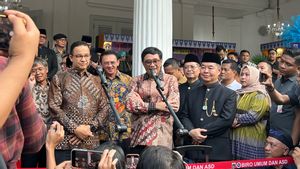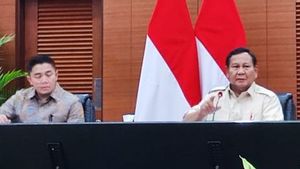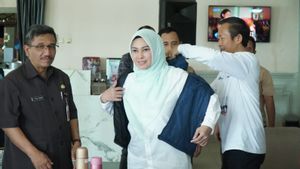JAKARTA - Minister of Manpower Ida Fauziyah said that the country's employment sector must prepare itself to welcome a new era of the world of work or the future of work. Because the COVID-19 pandemic has accelerated the 4.0 revolution.
Minister of Manpower Ida said a series of new technologies would also be a challenge for workers in Indonesia. He said the challenge that must be anticipated by the Indonesian labor sector from the industrial revolution 4.0 was the presence of the use of digital technology. Then, automation and rapid data exchange in all aspects.
"The world of work is now driven by things such as artificial intelligence, internet of things and big data," he said in the dialogue on Joint Efforts to Break the COVID-19 Pandemic and Awakening the Economy of the Apindo National Coordination Meeting, Tuesday, August 24.
The Minister of Manpower also said that the transformation in terms of ability and employment cannot avoid the employment sector from economic disruption and other fundamental changes in line with the movement from the old economy to the new economy.
Ida said the world economic forum (WEF) in its latest report estimated as many as 97 million new jobs. However, at the same time there were 85 million jobs that were reduced. In Indonesia, McKinsey in his report predicts that there will be 23 million types of jobs affected by automation.
"And there were dozens of new jobs that emerged during that period. We all, the government, employers, workers must be prepared to enter the future era of work," he said.
Ida said that the role and cooperation between employers and the government is indeed the key in the recovery of the employment sector. He acknowledged that the pandemic was a tough test for all parties, especially with the restrictions on community activities.
"In the period when the PSBB was implemented last year and PPKM since early June until now. It is understood that this test is really tough, not only for entrepreneurs. But believe me that the workers and we the government feel the weight of the COVID-19 pandemic. maybe we'll just keep quiet about this big problem, we've all been, are and will continue to struggle," said the Minister of Manpower.
For information, based on data from the Central Statistics Agency (BPS) that the working age population affected by COVID-19 in February 2021 was 19.10 million people and experienced a decrease of 10.02 million people or 34.41 percent compared to August 2020.
Meanwhile, the composition of the working age population affected by COVID-19 consists of 1.62 million unemployed people with a composition of 0.65 million people who are not in the labor force (BAK) and 1.11 million people are temporarily not working. Then, there were 15.72 million working people who experienced a reduction in working hours.
The English, Chinese, Japanese, Arabic, and French versions are automatically generated by the AI. So there may still be inaccuracies in translating, please always see Indonesian as our main language. (system supported by DigitalSiber.id)













